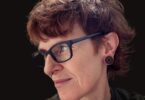Georgina Beaty
[mks_dropcap style=”letter” size=”52″ bg_color=”#ffffff” txt_color=”#000000″]E[/mks_dropcap]veryone was in the middle of a game when Yvonne walked in, an hour late to her own baby shower. The living room was crowded with Lindy’s colleagues: the gym teacher, vice-principal and a few other teachers Yvonne didn’t recognize. Lindy’s grade-12 drama students leaned against the couch, sat cross-legged on the floor, filling any negative space. All the attention was focused toward a woman with a frosted bob—the math teacher?—as she was blindfolded then spun around.
Yvonne tried to pass through to the kitchen unnoticed but sneaking was impossible, eight months pregnant with twins and the person everyone was waiting for. There was a cheer in Yvonne’s direction and she said, “Keep playing, keep playing!” and waved the attention back toward the game.
Yvonne hadn’t invited anyone from work and now she saw that left only her mom, Ronnie, sitting on a stool with a Bud Light, on her team. Lindy brought Yvonne a ginger ale in a champagne flute, her turquoise-rimmed glasses, eyes wide and open, ready to love. The drama-teacher streak of bright pink in Lindy’s hair made Yvonne think of the salmon, the way they got brighter and brighter the closer they came to their natal pool, the closer they got to death, really.
Lindy brushed her hand over the silk-screened image of two parr—teenage salmon—stretched taut over Yvonne’s stomach, swimming around. “I hope they’re better looking than that.” There was no further comment on Yvonne’s tardiness—maybe anything was forgivable at this stage.
One of the high school girls handed the blindfolded math teacher a large photo that was hard to identify until Yvonne realized it was her own eye, blown-up and taken out of context.
The teacher lurched towards a pin-the-tail-on-the-Picasso composite of Lindy and Yvonne’s faces. Lindy’s ear had been pinned where a mouth would normally be; Yvonne’s nose was floating in space off to the side of the face. The math teacher pinned Lindy’s enlarged eye where a nose belonged and everyone shriek-laughed at the horrific results.
Ronnie started to hack-laugh, “Hey, it looks like me.”
It wasn’t not true. Yvonne imagined nursing two chain-smoking babies, each with three missing fingers as if the legacy of Ronnie’s mill accident could somehow be marked into her own and then her offspring’s DNA.
Lindy had been the one to suggest that they hold the baby shower at Ronnie’s rather than their own home. She’d thought that it might be an incentive for Ronnie to engage with the world, a.k.a. clean house, but no. Yvonne’s grade-school photos still peeled away from the smoke-stained walls, antlers of ungulates clustered above, stack of sci-fi books lines the baseboards, while Ronnie’s lifetime collection of salt-and-pepper shakers gathered dust on corner shelves.
Lindy clapped for attention. “Take your seats!”
As the adults sat, the teenagers rose from their positions of interstitial lounging to dominate the room. They cleared a stage area and one of the boys hauled the dusty La-Z-Boy to the front row in a show of strength and gestured for Yvonne to sit there.
Lindy made eye contact and winced—delight mixed with apology—as Yvonne was led to the chair. A girl who disappeared into herself, shoulders caved in, long hair falling in front of her face, said, “Lights out,” in a surprisingly loud voice and Lindy took them to black. Yvonne could hear the teenagers rustling into position.
When the lights snapped back on, the teenagers were all wearing pink hoodies and lying on the floor, flopping about on their bellies, fish mouths gasping for air. One of them had his lower jaw thrust forward as if his under bite would propel him upstream. It was uncanny, the portrayal so very accurate.
One of the tallest fish, bespectacled and sporting a patchy attempt at a beard, flopped over to a microphone and started in on a rap called “Back to Burns.”
“Had my ocean winter now I’m feeling kind of low, Gotta get myself upstream, I know just where to go.”
Yvonne found herself leaning in as if he might actually know something about salmonoid physiology or psychology. She had dropped by Pikino Lake Project that afternoon to sit with Helen, her colleague from Department of Fisheries and Oceans, on the viewing bridge, their thumbs poised over tally whackers as they watched one lone salmon eject up from the river, up, up, up, and fall back down to the bottom of the fish ladder. The whole river system from near Ronnie’s house up to Pikino Lake was a gradient of desperation—from sunset pink to electric red. It was mid-run already and though Yvonne had expected strong returns, it was shaping up to be the worst year on record and she didn’t have the answers that it was her job to provide.
Ronnie hork-laughed beside Yvonne as the girl with the hair in her face started in on a salmon stand-up routine about the complications of an anadromous life. She weighed out whether to return to the conservative fresh waters after the thrill of a salty ocean winter. The assembled teachers were hooting at the performance. Yvonne was thinking about the one fish that had made it through the gate—the way that she and Helen cheered. The stakes were human, while the fish, indifferent to the celebration and unaware that any infrastructure had been set up to aid its survival, swam into the calm of the spawning grounds to lay five thousand eggs, milt and die.
Everyone was applauding and she had missed the last moment, had missed any answers. Ronnie coughed so hard that it seemed pieces of lung must have broken off and lodged in her throat. The chitchat rose slightly in volume—a strange version of decorum where people pretend that nothing out of the ordinary is happening—and Ronnie made her way out of the room, through the kitchen door and outside.
Yvonne was glad to have a reason to leave and heaved herself out of the La-Z-boy to follow her mom to the woods rimming the back lawn.
“Ronnie, you’ve gotta go back to the doctor.”
Ronnie coughed so violently that she threw up in the bushes. She let up a final rattling cough and spat into the woods. “If they want to cut me open, they can do it when I’m dead.”
Ronnie waggled a blister pack of thick, numbing throat lozenges. “Besides, I got my treatment.” She popped one into her mouth then lit up a cigarette, pulling the smoke in over the cough drop, her home remedy for stage-four cancer, which had been the diagnosis for five years now. They stood in silence a moment, the musty smell of rotting leaves mixed with the syrupy sweet red-dye smell of Ron’s candy.
“How’s the returns looking?” said Ronnie.
“As if I would know. I’m on leave, aren’t I?”
They stood in silence while Ronnie smoked. Yvonne could hear the river from here but no matter how hard she listened, she couldn’t hear the salmon thrashing themselves upstream, over the small rapids toward Pikino. Yvonne had headed up the project for the past four years and taking leave in the middle of the run felt like taking a cast off a broken bone too early. Perhaps there was greater ocean die-off due to warmer ocean temperatures and low food supply. There was another theory that fish from spawning grounds weren’t able to scent toward their home as well as the “real” salmon, the wild stock left to their own devices with no human intervention. Yvonne half wondered if the fish could scent just fine and were making more evolved decisions. Maybe they simply decided not to go back home.
Yvonne had sat with Helen for several hours willing more fish to materialize. A black bear lumbered out beneath them and sniffed at the kelt-tinged air. Not finding anything worth eating, it turned back to the forest. Which was when Yvonne’s phone rang and Lindy was saying, “It’s hard to have a baby shower when no one in the room is pregnant.”
She was at least an hour away. As Yvonne walked back to her truck, Helen had tossed the T-shirt to Yvonne and yelled, “I want the salmon to come back, not you. Go have your babies.”
It made Yvonne feel pregnant in her throat to think of Helen driving five hours to Prince George for a silk-screened shirt. As she drove home, she wondered if she could have invited Helen to the baby shower. They could have talked about whether there should be a catch-ban in place instead of what the names might be, what the babies might look like.
Lindy stuck her head out of the screen door. “Time for presents!”
Ronnie barked back, “Trust a drama teacher to have a baby shower in three acts.”
As they headed to the house, Yvonne watched Ron’s cigarette burn down and before it was too late said, “Can I?”
Ronnie didn’t judge. She handed the smoke over and Yvonne took the last drag—terrible, mentholated, perfect.
In the kitchen, Lindy kissed Yvonne but pulled back at the taste of the smoke. “What’s going on?”
“Hungry,” said Yvonne. A need Lindy could meet. Lindy got Yvonne a bowl of fish chowder but the smell was all thick, wrong and impossible.
Ronnie yelled from the living room, “Come on you two, she’s already knocked up!”
Yvonne received the soother that wouldn’t be habit forming, a rubber giraffe for teething, miracle baby-bum cream. Then Ronnie handed over a whole carpetbag. A pair of old prescription glasses, her favorite skunk salt-and-pepper shakers with one broken-off tail.
Yvonne thought maybe Ronnie had smoked too much home-grown to deal with the pain. “Mom, you use these things.”
“No. They’re for the babies.”
Yvonne pulled out two cans of orange Crush.
“Well, that’ll give a flavour to the amniotic fluid,” the math teacher laughed. Nothing was funny. Here was a whole event designed to get everyone frothed up about simple biology but there was Ronnie, divesting of her nail clippers, disintegrating in front of them, and no one could talk about what was happening. They all pretended it was normal and just moved on.
The presents dispatched, Lindy’s students, the high school girls, asked, shy, if they could touch Yvonne’s stomach and Lindy was the one to grant permission.
Yvonne didn’t mind the light touch of the girls’ hands, their chewed, multi-coloured fingernails. Lindy acted like an interpreter at the life-cycle display at Pikino Lake. She crouched at Yvonne’s belly height. “Before the doctors implanted, they inserted this small camera in Yvonne’s uterus. It’s like a sky filled with fluffy pink clouds in there, it’s like cotton candy. Anyone would want to settle in for nine months!”
“And then they mixed six of Lindy’s eggs with some dude’s milt and threw it all in.”
A shallow warning breath from Lindy and Yvonne resolved to shut up. Lindy would have been carrying had it not been for an unstable cervix and so Yvonne had offered, had wanted this. The girls weren’t looking at Lindy or Yvonne; they were focused on the slightest seismic shift beneath their hands.
A foot or elbow pressed out from Yvonne’s stomach, about to break out or maybe resisting the idea of an exit at all. The girls cooed.
“Don’t get too interested now,” warned the vice-principal.
The adults stayed further back, like anthropologists observing a ritual.
“It just transforms you,” said the math teacher. “Did you know that your pupils will dilate when the babies look into your eyes? It’s wild. The size of your pupils will change their brains and allow them to develop secure attachment.”
“Let me see your pupils,” Lindy said to Yvonne, teasing.
“Little mouse turds,” Ronnie jumped in. “As big as tiny little mouse shits.”
“The babies can look in Lindy’s eyes,” said Yvonne.
The girls were still now but kept their hands on Yvonne, waiting. It started to feel like a séance.
The gym teacher, the sort to wear shorts through the worst of winter, broke the silence. “My wife and I found that perineal massage really helps to prevent tearing.”
Lindy nodded, earnest.
“You’ll bounce right back.” The vice-principal gave Yvonne a light punch to the shoulder.
“God,” said Ronnie, “At least when I was pregnant, I knew it was going to be a disaster. Ripped apart and then good luck putting yourself back together.”
The teenagers took their hands away.
Yvonne excused herself to the washroom, but instead just stood in the kitchen looking at the only blank space—the door of the fridge which was uncluttered save for the blare of the “Do Not Resuscitate” order Ronnie had put up three years ago and never taken down. Ron’s very alive laugh from the other room. The tick of the cat clock on the wall, a plastic tail tocking back and forth.
Yvonne grabbed a can of Crush, and walked out the back door, stopping at the garage to grab a fishing rod then continuing to the road. Ten minutes to the river, the taste of artificial orange, her mother’s carbonated expression of love. There wouldn’t be many fish down here, this far into the run and this far away from the spawning pools, but she just wanted to haul out one. She wanted to count the number of scale rings to read how many ocean winters it had put in—as if she might be able to see from those who came back why so many didn’t.
Carcasses were caught in the branches at the side of the river like tattered white flags or used Kleenex. A few streaks of pink were still visible, moving upstream. She no longer understood the limits of her swollen body so she didn’t go in very far, only calf-deep. She figured she had time for five casts but it was on the third one that she felt a nibble and pulled a fish up into the air. It wrested its body back and forth, a fevered red. There was no need to open it up to see what was going on, everything was clear from the outside—she didn’t need to take a sample and count the rings under a microscope—it wasn’t very large, probably only one ocean winter, and it wasn’t likely to make it. The salmon thrashed off the hook with enough force to throw Yvonne backward—still alive. The cold water rushed up to Yvonne’s stomach and around her, so cold that she could feel the distinction between her own body and the bodies within her. The sockeye disappeared up into the river system, the light in the water so low now that she couldn’t make out any fish in the unreadable dim rush.
She rolled over onto her hands and knees into the shallows and pushed herself back up.
It was impossible to see what the returns would be and whether they would be enough.
Georgina Beaty is a writer, actor and artistic co-director of Architect Theatre with whom she co-created four shows including: Like There’s No Tomorrow, This Must Be The Place (Passe Muraille) and Highway 63: The Fort Mac Show. Her solo play Extremophiles has toured festivals across Canada, her poetry appeared in Frontenac Press’ anthology Gush and she has forthcoming fiction publications in The New England Review and Neon magazine. She holds an MFA in Creative Writing from UBC and is currently performing in Counting Sheep: Staging a Revolution with Belarus Free Theatre in London, England.






